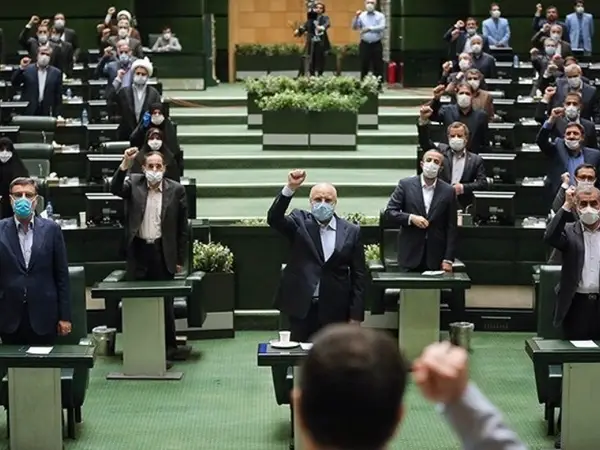The ongoing nationwide uprising in Iran appears to have led to an escalation in confrontations among various ruling conservative and hardliner groups.
How to deal with the protests and solve the biggest crisis in the clerical regime’s 43-year history is one of the main subjects that divides Iran's conservatives who have already lost the nation's trust. They have been controlling all three branches of government for more than a year, with disastrous economic consequences.
Although Iran's situation is currently more serious to allow any room for factional infighting, the hardline conservatives who have refused any reforms during the past four decades, and the neo-cons who want to appear open to some changes, are currently at loggerheads.
Hardliner conservatives refuse to accept any suggestion of reforming the political system in the face of an uprising, while the neo-cons have made vague references to better governance.
According to Rouydad24 website, the difference over the approach to the protests could be the starting point of delineations among various parts of Iran's conservative camp. One of the signs of emerging differences occurred when an influential member of Supreme Leader Ali Khamenei's office, Mehdi Fazaeli, cautioned Mashhad’s firebrand Friday Prayer Imam Ahmad Alamolhoda earlier this week over his insulting comments about Iranian women.
This, at the same time, could mean that the Islamic Republic can shrewdly expel insiders when the regime's survival is at stake. Although Alamolhoda has been criticized on many occasions for his radical fundamentalist comments, this was the first time he got a serious slap in the mouth in public by someone he cannot respond to.
On the other hands neo-cons such as Majles Speaker Mohammad Bagher Ghalibaf and Tourism Minister Ezzatollah Zarghami have called for "a change in governance" in the interest of some open-mindedness that would appease and calm angry protesters. Khabar Online wrote that the duo do not want to tie their political future to the fate of an inefficient president and that this is part of their attempt to rebrand themselves for the 2025 Majles elections and 2025 presidential race.
At the same time, ultraconservative Raja News has likened the neo-cons to "flags in the wind" and accused them of lacking steadfastness and compromising conservative values such as compulsory hijab.
The two sides' media outlets are also fiercely fighting over a vacancy in Raisi's cabinet afterf Roads Minister Rostam Ghassemi resigned. The IRGC's weekly newspaper Sobh-e Sadeq has also harshly criticized Ghalibaf, who is still an IRGC general, for his idea of "reforming governance," nonetheless, the IRGC's weekly newspaper elsewhere admitted that "The country's governance needs essential changes," probably meaning that change is needed but it should not be made by Ghalibaf.
A statement by lawmaker Jalil Rahimi Jahanabadi in an interview on November 23, revealed that the infighting is deeper and wider than quarrels between two politicians or their media outlets. Jahanabadi who is a member of the National Security Committee of the Iranian Parliament said: "The heads of the three powers of the Iranian government, i.e., President Raisi, Judiciary Chief Ejei and Parliamentary Speaker Ghalibaf, are constantly swearing at West and East instead of trying to solve the country's problems."Meanwhile, he pointed out that the "violent security approach" to protests cannot solve Iran's problems.
Although for the first time a politician has taken criticism of the government to a higher level, still, like all Iranian politicians, Jahanabadi was too intimidated to name Supreme Leader Ali Khamenei as the man responsible for Iran's problems.
"The pressures by the enemies, the sanctions, the system's inefficiency and the government's weakness have left the political system in a situation that it cannot meet the people's demands," said Jahanabadi who also pointed out that views of officials are in sharp contrast to what people think. Meanwhile, he harshly criticized "non-elected" conservative individuals such as the editor of Kayhan newspaper who constantly invade people's privacy and speak for the people without having any credentials.
The infighting among Iran's unwanted conservatives is reminiscent of a Persian saying: "Two guests hate each other, but the host hates both."
